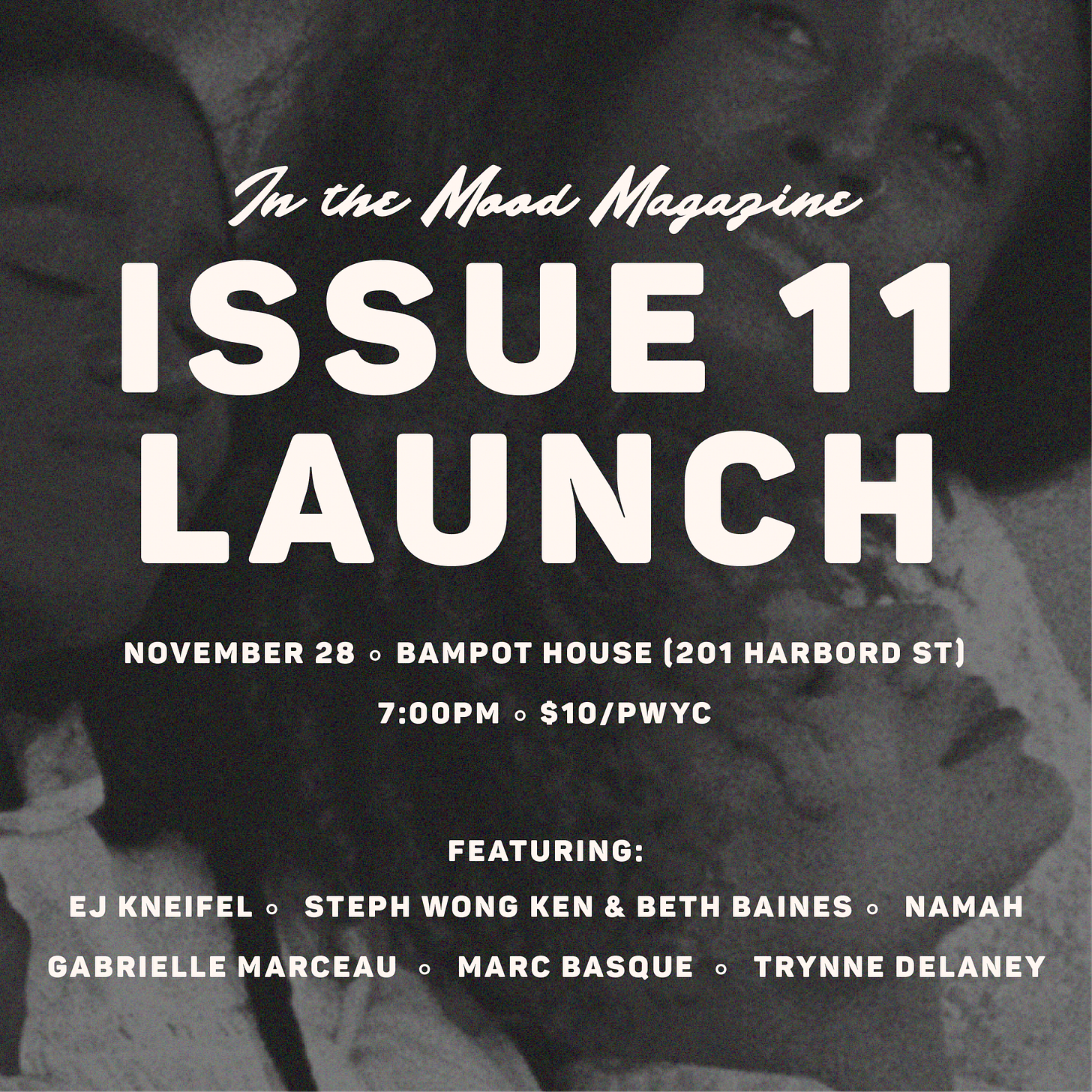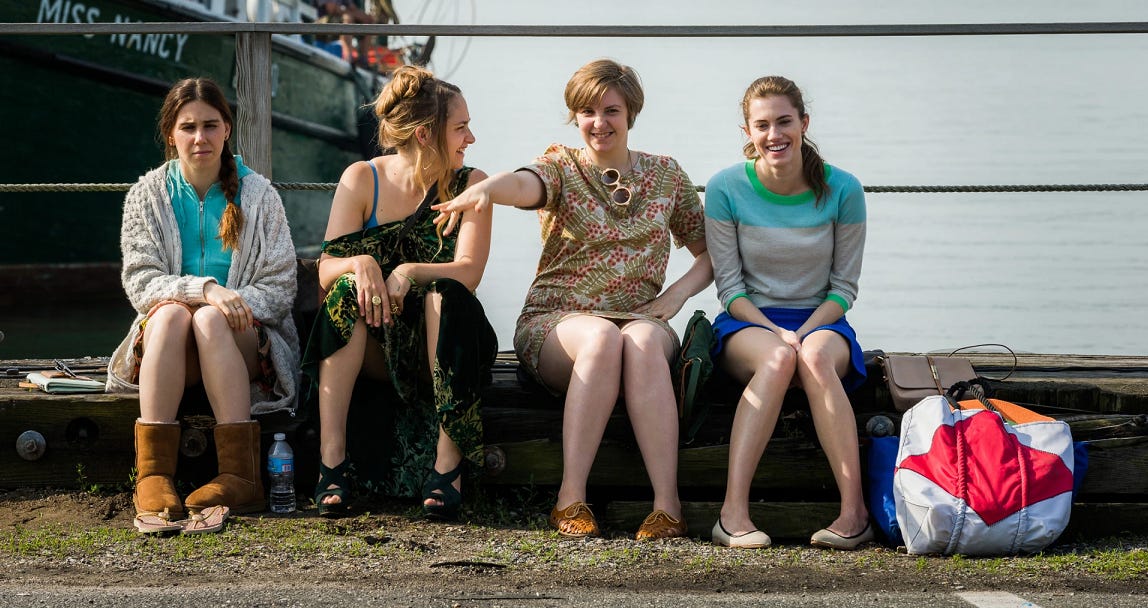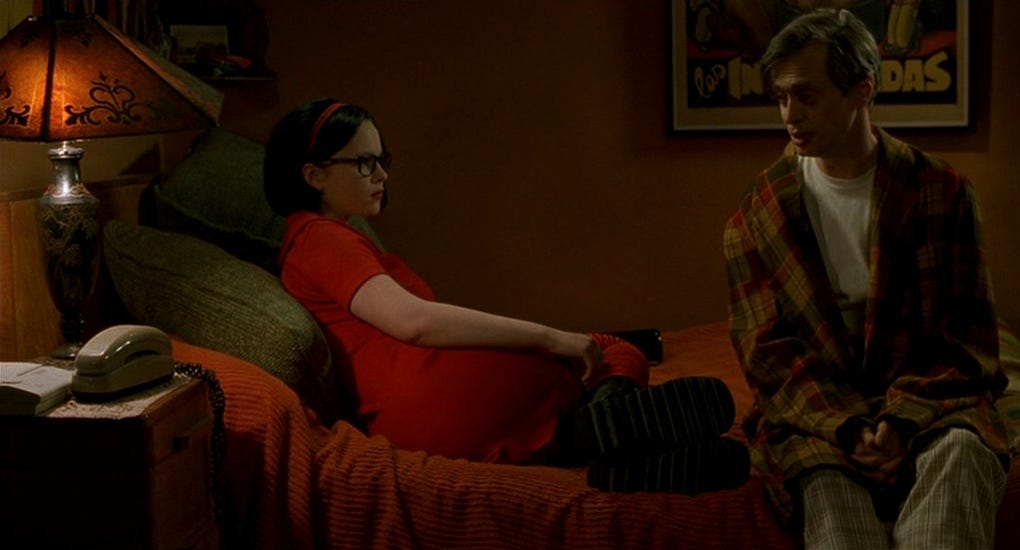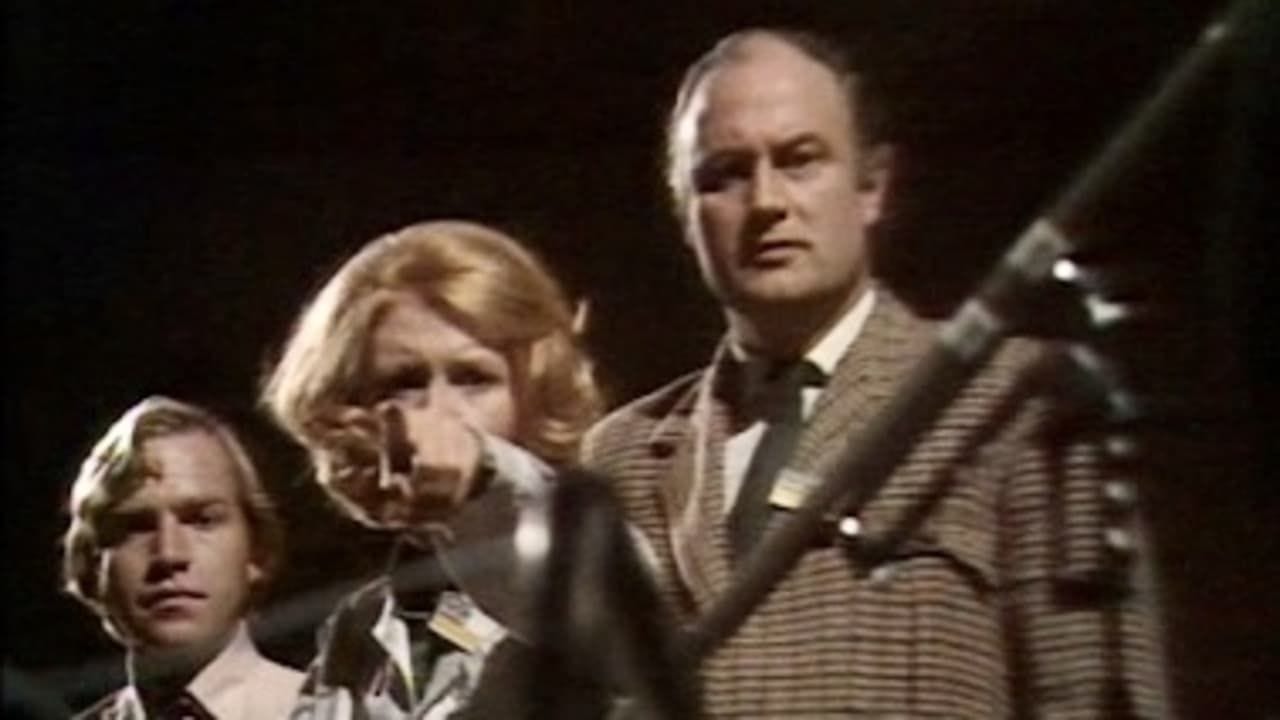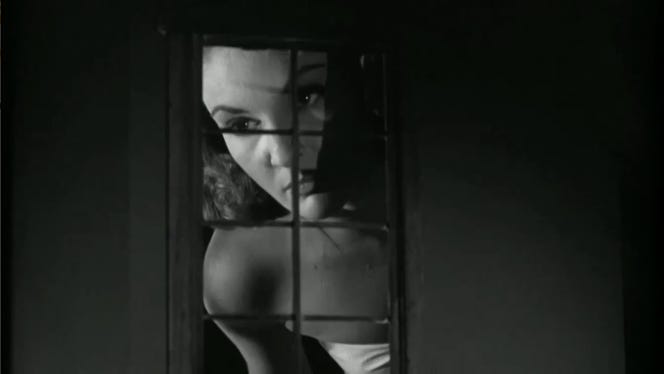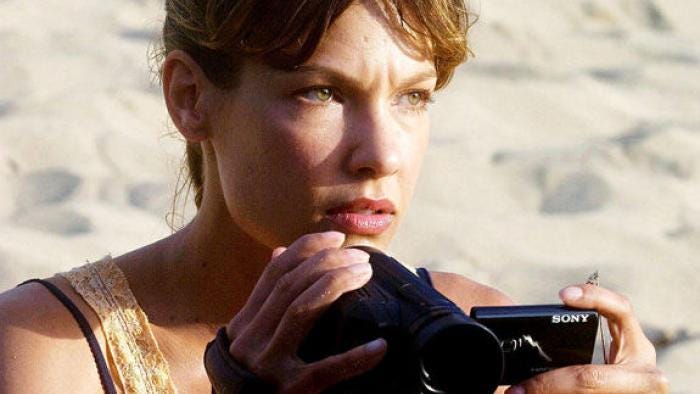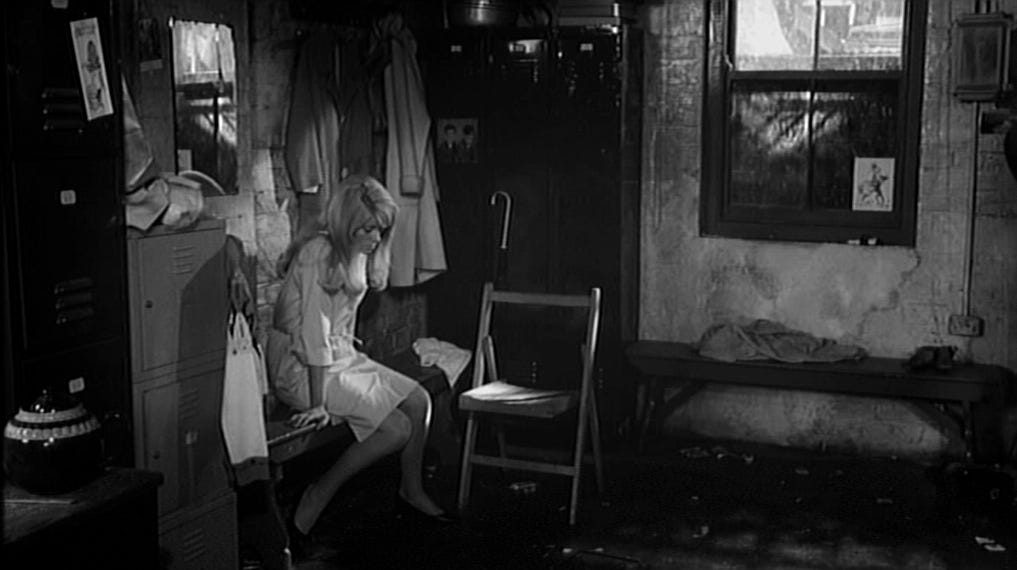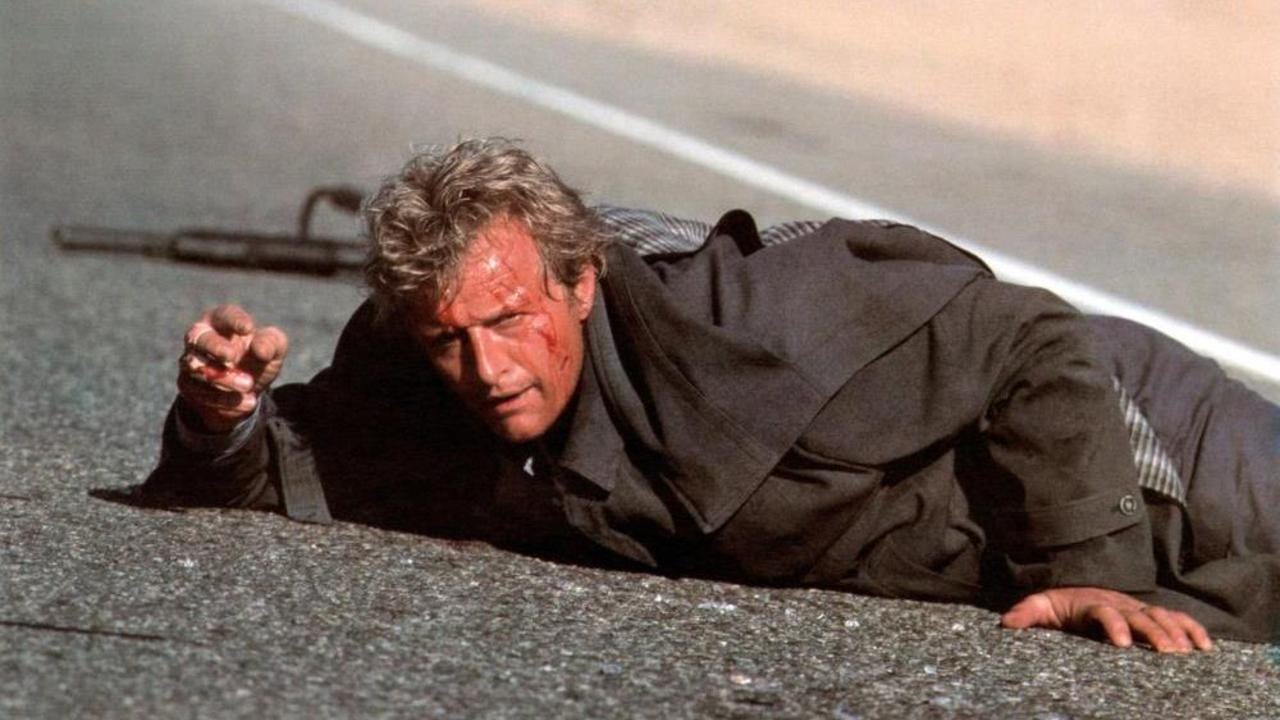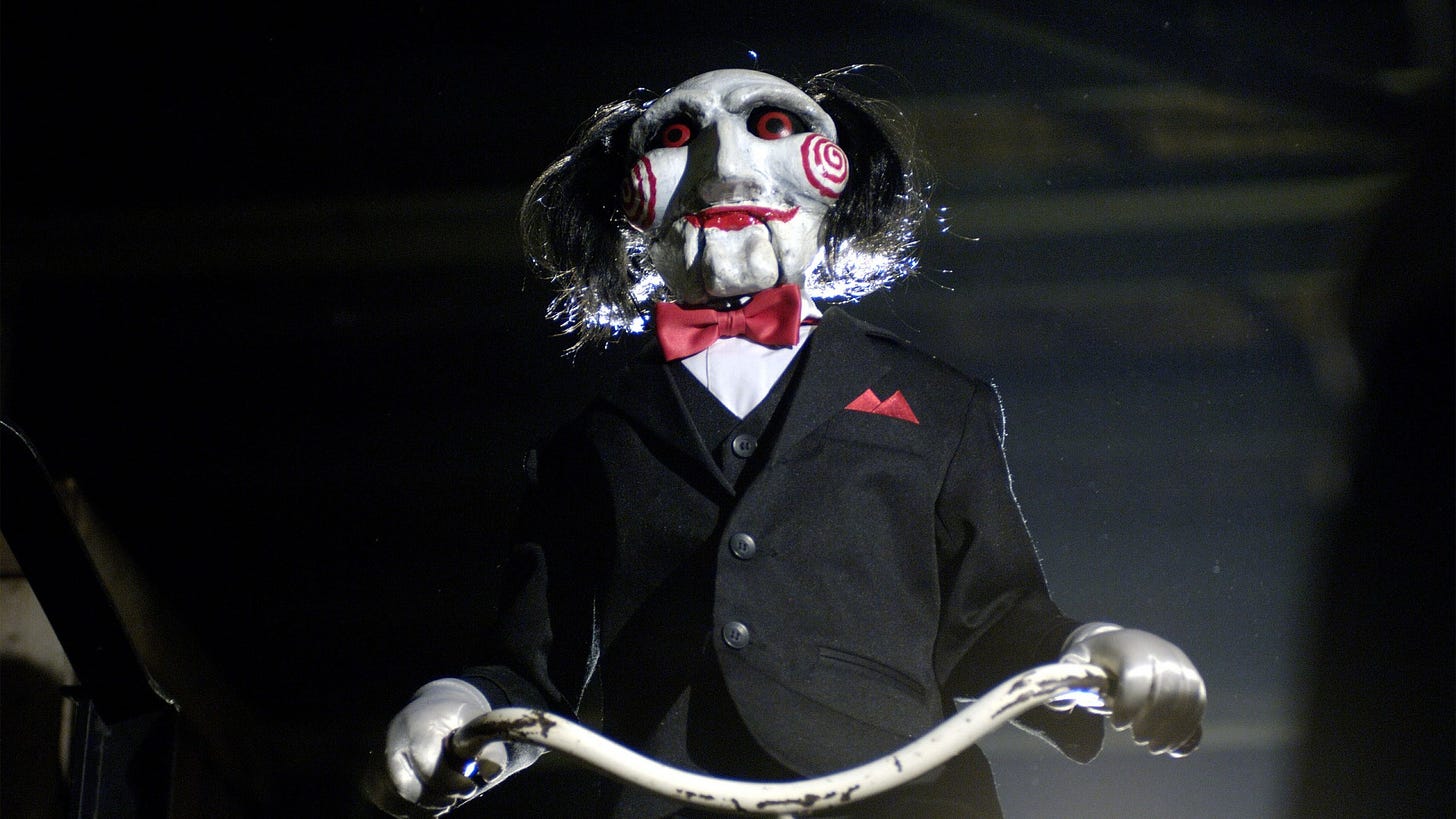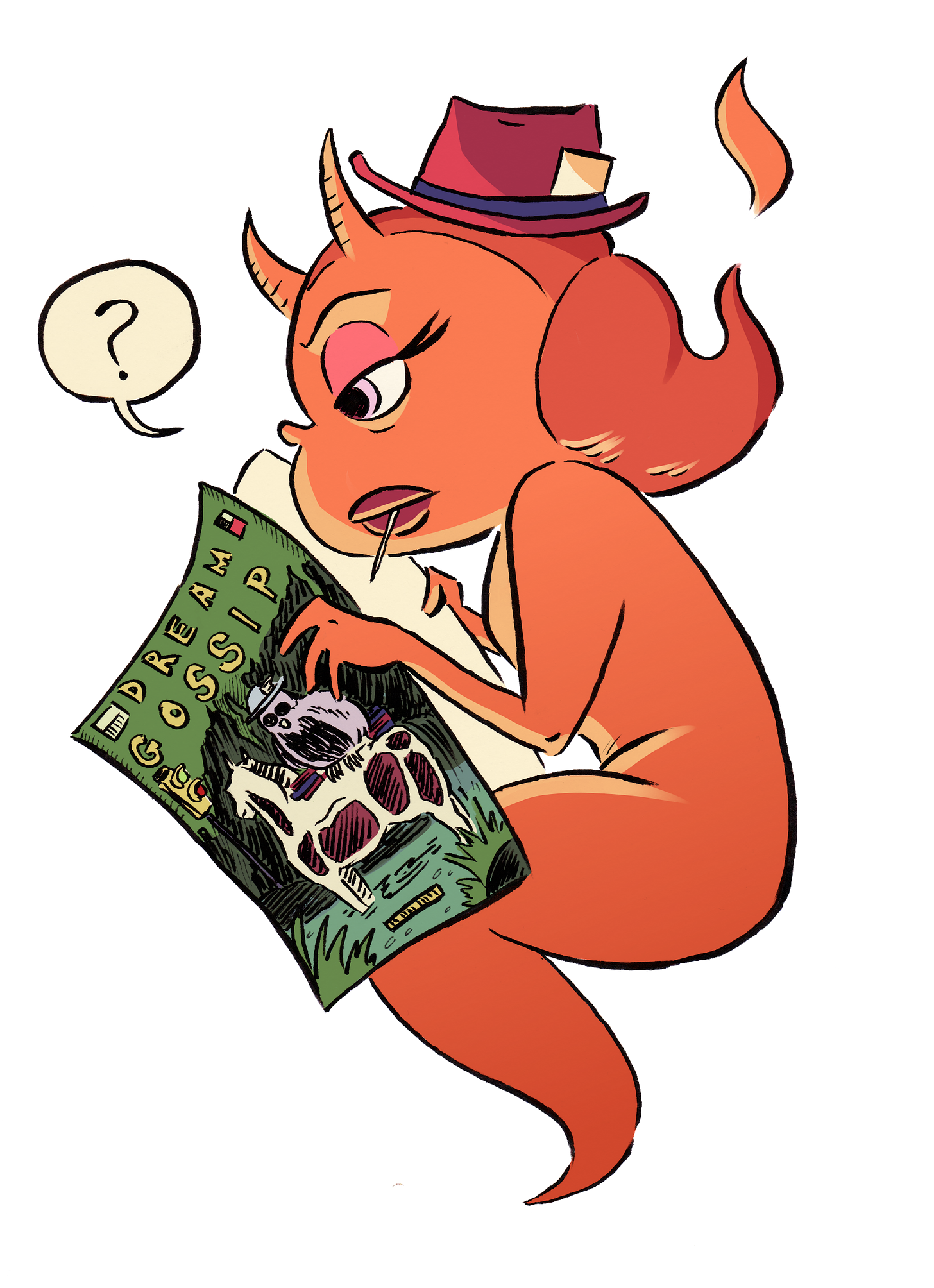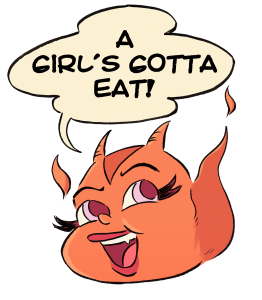Spooky Movie Recs + Saw's 20th Anniversary 👻
Happy Halloween from In The Mood — plus, check out the lineup for our Issue 11 launch party!
Issue 11 Launch Party 🕰️
Join us for an evening of film & pop culture readings and games to celebrate the launch of Issue 11: Out of the Past!
November 28 ◦ 7:00pm
Bampot House (201 Harbord St, Toronto) ◦ $10/PWYC
FEATURING:
EJ Kneifel
Gabrielle Marceau
Marc Basque
Namah
Steph Wong Ken & Beth Baines
Trynne Delaney
Hosted by Sennah Yee & Cleo Sood
Cleo from 24 to 7
A column by Cleo Sood for the chronically online in a culture that never sleeps.
Girls Just Wanna Be Gross
It’s difficult for me to imagine a time in our culture when women insisted they don’t fart because every girl I meet announces her IBS as if it were a Miss America title. These days, it’s “Hot girls have IBS.” These days, all girls are gross. And I’m not talking about the nasty women who knit themselves hats and Hilary Clinton-style pantsuits; the women who are allegedly the daughters of the witches they couldn’t burn. Or maybe I am talking about those women—I don’t know, have they ever stuck a wad of toilet paper in their panties in lieu of a tampon and worn the same unwashed bra every day for six months? You know what, now that I think about it, when I say “all girls are gross,” I’m talking about the nasty neoliberal knitters, too.
And I fully acknowledge that I’m making this claim as a woman comedian—which is to say, I’m saying this as a breed of womankind who has long embraced her vulgarities in the most open fashion: onstage with a microphone. Being gross is one of the few subjects I don’t have to research. Rest assured that in writing this, I’ve done my research. At a recent comedy show, I asked the audience, “Ladies, are you a gross sicko pervert?!” Their response was a chorus of woos, and that brief exchange now feels like a well-researched confirmation of my highly intellectual thesis: all girls are gross, but some girls are more gross than others.
The polite-looking lady, engrossed in a girly-looking paperback is actually reading hardcore BDSM smut. Like the velvet curtains at the back of an old video store, cutesy cartoon covers conceal pornography. The blonde bombshell influencer, Alix Earle shows viewers a vomit-covered dress hanging in her closet. Commenters condemn Alix, saying, “That’s not sexy. That’s disgusting.” But Alix doesn’t delete her video; she doesn’t cower in shame.
You could argue that it's easy to be gross if you’re conventionally attractive—strangers want to revel in your muck; buy your bath water—or if your salacious subway porn is also an “Oprah’s Book Club” pick or if you’re merely exchanging memes in the algorithmic echo chamber that is “hot girls do blank.” (Chances are the hot girls with IBS had a hot girl summer and are hot girls voting for Kamala Harris.) It’s easy to be transgressive when your transgressions are contained. After all, when I candidly recount the experience of waxing my asshole to an audience, I could be construed as saying, “I ripped off the hair in every crevice of my body to fit beauty standards, you know, so my flesh could be more desirable to MEN! Bleh!” The last part might be the most grotesque act of them all. Despite the degrees of our degeneracy, it remains that women are sharing their sins with each other: followers and the knowing sales clerk at the local bookstore, the algorithmically-reachable hot girls and the gross sicko perverts in the crowd.
There’s a certain type of thin, pretty, well-off, intellectual white woman who’s long been enticed by the abject feminine and generally accepted in her exploration because she isn’t downright repulsive. It’s Pheobe Waller-Bridge in Fleabag and the protagonist of Ottessa Moshfegh’s My Year of Rest and Relaxation. It’s in that Sylvia Plath poem “Cut” about a girl who nicks her thumb: “Dirty girl,/ Thumb stump.” It’s the hairy-armed women liberationists who went on to get laser hair removal and found themselves handsome partners with whom they made beautiful homes. To be a gross fat girl, a gross poor girl, or a gross black girl is a different thing entirely because being an ugly, fat, poor, or black girl is an inherent abjection. But when I say, “These days, all the girls are gross,” I’m talking about the ugly, fat, poor, black girls, too.
I’m talking about girls critics and I both call repulsive narcissists, but these girls are never unlikable, at least not to me. It’d be mean to assume that I’m talking about Lena Dunham’s Girls, but it’d also be correct. Girls premiered on HBO in 2012 and ran for six seasons before its conclusion in 2017. Girls was a notorious hate-watch and the subject of numerous negative think pieces. The show’s star and creator, Lena Dunham was ridiculed for her excessive display of flesh and filth, she was accused of being fat and fugly. It’s been over a decade since Girls premiered, and we’re seeing a resurgence of the show in the zeitgeist. This time around, the consensus is that Girls is a great piece of television. A decade later, and we’ve entered the era of femcels and girlflops. A decade later, and Lena Dunham is indeed a voice of a generation. The Zoomers have spoken: we resonate with unbecoming inhibition; we’re so fucking gross. As I scroll through my TikTok “for you page,” I see clips of the best/worst of Hannah Horvath; edits of deadpan eccentrics, Enid and Rebecca from Ghost World; the stoner misadventures of Broad City’s Ilana and Abbi. These filthy women—the femcels and girlflops—didn't just fall out of the sky and onto our screens. They’ve been around for decades, but now their types have names, now they’re championed and embraced, now they’re the protagonists of their stories and not just mouthy side characters supplying comedic relief. The generally innocuous hot messes and abject intellectuals operate on an aspirational wavelength while the girlflops and femcels have strange sex with even stranger people, they move through the world with a sort of unhinged deftness; their stories don’t feature makeover montages or picture perfect happily ever afters. Their stories more closely resemble the filthy, fumbling experience of being alive.
Up on stage, I tell my own stories, jokes about the strange sex I’ve had with even stranger people, jokes about the sort of unhinged deftness with which I move through the world; the punchlines boast such topics as my own projectile vomit, scandalous smut, and anal bleaching. I squint and spot women in the crowd. The older women in the back throw their heads back and belly laugh, a stylish 30-something on a date covers her faces as she giggles, two friends groan before exchanging a look and gwaffing together. As women, our bodies betray us: too big, too wrinkly; we bleed and birth babies; we have enormous, excessive feelings; the world expects a lot of us; we expect even more of ourselves; we get too drunk at parties and puke on the hardwood and then glide across the puke in our heels and trip and sprain our ankles. Wait. That last one might just be me. Oh well. I know you understand what I’m talking about. I know that sometimes—more than anything else—you just want to let yourself be gross.
Cleo Sood is a Toronto-based writer and stand-up comedian that hates writing and loves sitting down.
Scary Movie Recs from In The Mood 🎃
We asked the In The Mood team to share a spooky movie reccomendation for Halloween (and one thriller for the horror-averse.)
The Stone Tape (1972)
“An unexpected pleasure this year was seeing the previously hard-to-find British TV movie, The Stone Tape by Nigel Kneale, which made the rounds on torrent sites this year and is now, gratefully, available on Shudder. Following a research team as they investigate a haunted room in a Victorian mansion, the film defies the expectations of its gothic premise, but is still amply creepy and atmospheric and more layered than your regular haunted-house fare.”
—Gabrielle Marceau, Editor-in-Chief
Attack of the 50 Foot Woman (1958)
“I had only known its sexy poster and playful parodies (like Lana Del Rey’s). This was a delightful surprise! Cathartic ‘good for her’ vibes, and its short but bittersweet 66-minute runtime is packed with beautifully eerie imagery: power line skylines, her inconsistent height, and her huge manicured hand bursting through doorways, flapping like a fish out of water.”
—Sennah Yee, Managing Editor
The Perfect Getaway (2009)
“A fun thriller, ‘whodunnit’ situation that keeps you guessing the whole way through. The first time I watched it, I was shocked by the end and thought it was really well done.”
—Kay Evans-Stocks, Creative Director
Repulsion (1965)
“Roman Polanski’s Repulsion is a horror masterpiece about what some might call the most frightening creatures in all of the lands… MEN! It’s ironic that the disgraced Roman Polanski should so accurately capture the horrors of womanhood and gender-based violence, but I guess the adage is true: Write what you know. It’s a controversial selection, I know! I’m sorry! But it’s also a deeply personal selection. During my recent rewatch of Repulsion, I was reminded of when I first began living on my own, and my father inquired if I’d “gotten crazier yet.” I asked what he meant by that, and he said “When crazy people start living alone, they get crazier.” I answered, “No. Not yet.” And then crawled under my bed. Catherine Deneuve’s performance as Carol, the film’s troubled protagonist, is utterly compelling and her hair is stunning. Mental illness has never looked so good. This Halloween, I hope you have a joyous time partying in your sluttiest costumes. I hope the camera flatters you and that men respect you, and I hope you watch Repulsion.”
—Cleo Sood, Assistant Editor
The Hitcher (1986)
“‘My mother told me never to do this’—with Rutger Hauer in top form as the titular force of hitchhiking evil, vehicular carnage shot in broad daylight, and one of the most gruesome deaths committed to film, 1986’s The Hitcher stands head and shoulders above most slasher flicks from its time—let Siskel and Ebert’s ‘two thumbs down’ stand as a testament to its unsung position in 1980’s horror canon.”
—Aidan Jeans, Illustrator
Saw (2004) premiered 20 years ago today—revisit Ky Capstick’s feature on Jigsaw and Tinder from our Horror issue:
RIP Jigsaw you would have loved dating apps 💔
by Ky Capstick
“To overcome something you have to understand what a perfect engine it is. That’s how you fight disease.”
—Saw (2004)
I’ve learned to measure the hunger of my loneliness by how slowly time moves when I am waiting for someone to text me back. Now six years into being mostly single, the small animal of my loneliness is an expert in the calculus of being wanted. It derives how long it should be before someone messages back by accounting for the time of day, the day of the week, every detail they’ve given, and every possible thing I could have done wrong. Its mathematics cannot be bargained with. If it says I will hear from them in two hours, and those hours pass without word, it takes control of my body and begins a cycle of fixation and distraction. The moment my mind finds peace, my hand reflexively reaches for my phone.
On its hungriest days, I leave my phone on the other end of my apartment. My loneliness and my phone become like the two men, Adam and Dr. Lawrence Gordon, chained to opposite corners in the original Saw. In the movie, Dr. Gordon remarks that someone must want them to know exactly what time it is because the clock on the wall is new. Like each of Jigsaw’s games, this one includes a deadline.
I set similar restrictions when using dating apps because they only appeal to me when I am at my loneliest. When the growling need is its deepest I re-download the same set of apps and swipe or tap or scroll. Too many nights with friends have been consumed by dating apps. From sneaking swipes before the drinks arrived to conversations blurred by the worry that some stranger will never message me back. Now, I allow myself no more than an hour a day. Two if someone’s cute and chatty. Notifications off so that both my attention and disappointment are intentional. This discipline, I’m convinced, will be rewarded.
Tinder®️ disagrees. According to a recently updated press release, restricting my use negatively impacts what they call my “match potential” (the probability that my profile will be presented to other users). Tinder®️ “prioritizes members who are active and active at the same time”. They want users to strike up conversations the moment they match. Theirs is a romance of immediacy. A digital approximation of flirting with a stranger in the middle of a party.
In the same press release, Tinder®️ explains that they don’t ask a lot of their members upfront so they rely on members using the app to learn about them. They account for things like what we write in our bios, how often our profile is liked and noped, and the characteristics of our photos—all in comparison to the members in our proximity.
Jigsaw, assumedly, performs a similar calculus when selecting his victims. Since his games force their players to face death in order to better value their lives, the selected individuals must have a demonstrated history of undervaluing their lives as well as the potential to change. In the case of Paul, a man whose game involved a maze of barbed wire, Jigsaw chastised him for performing an act of self-harm despite being “a perfectly healthy, sane, middle-class male”.
In the mood for something more?
Dive into the juicy archives of our newsletter and our online magazine.
Wondering what to watch?
Choose a mood on our Film Recommendation Generator and get a curated pick from writers, filmmakers, and poets.
Support us!
If you’d like to donate to our mag, here’s our PayPal! We’re volunteer-run, and donations go directly to our contributor honorariums and operating costs.



